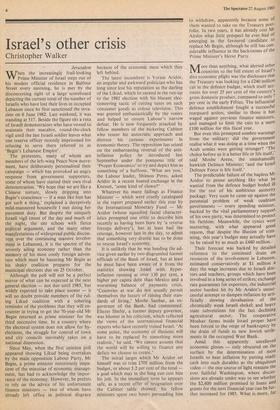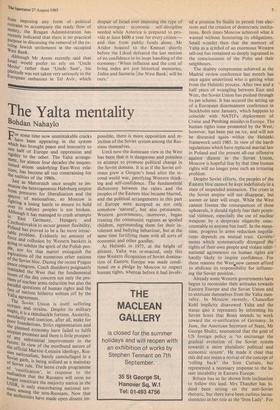Christopher Walker
Jerusalem
When the increasingly frail-looking Prime Minister of Israel steps out of his modest official residence in Balfour Street every morning, he is met by the disconcerting sight of a large scoreboard depicting the current total of the number of Israelis who have lost their lives in occupied Lebanon since he first sanctioned the inva- sion on 6 June 1982. Last weekend, it was standing at 517. Beside the figure sits a rota of Israeli demonstrators who have vowed to maintain their macabre, round-the-clock vigil until the last Israeli soldier leaves what
one reserve officer recently imprisoned for refusing to serve there referred to as 'Begin's Lebanese Empire'.
The protesters, many of whom are members of the left-wing Peace Now move- ment, have deliberately personalised their campaign — which has provoked an angry response from government supporters, some of whom have started their own rival demonstration. 'We hope that we are like a Chinese torture, slowly dripping into Begin's conscience — if a man like him has got such a thing,' explained a deceptively mild-mannered housewife I met doing her pavement duty. But despite the uniquely Israeli vigil (most of the day and much of the night, the site echoes with fierce political argument, and the many other manifestations of widespread public discon- tent, over the continuing massive involve- ment in Lebanon), it is the spectre of the severely ailing economy rather than the memory of his most costly foreign adven- ture which must be haunting Mr Begin as his shaky coalition prepares for the municipal elections due on 25 October.
Although the poll will not be a perfect mirror of what can be expected at the next general election — not due until 1985, but widely expected to take place sooner — it will no doubt provide members of the rul- ing Likud coalition with a sobering reminder of the problems that they will en- counter in trying to get the 70-year-old Mr Begin returned as prime minister for the third successive time. In a country where the electoral system does not allow for by- elections, the struggle for control of town and city councils inevitably takes on a national dimension.
Since May, when the first opinion poll appeared showing Likud being overtaken by the main opposition Labour Party, Mr Begin, a prime minister notoriously impa- tient of the minutiae of economic manage- ment, has had to acknowledge the impor- tance of the economy. However, he prefers to rely on the advice of his unfortunate finance ministers — two of whom have already left office in political disgrace because of the economic mess which they left behind.
The latest incumbent is Yoram Aridor, an angular and awkward politician who has long since lost his reputation as the darling of the Likud, which he earned in the run-up to the 1981 election with his blatant elec- tioneering tactic of cutting taxes on such consumer goods as colour television. This was greeted enthusiastically by the voters and helped to ensure Labour's narrow defeat. He is now frequently attacked by fellow members of the bickering Cabinet who resent his autocratic approach and distrust his curious experiments in economic theory. The opposition has seized on the embarrassing reversal of the anti- inflation policy he introduced last September under the pompous title of 'Proper Economics' to try and depict him as something of a buffoon. 'What are you,' the Labour leader, Shimon Peres, asked Aridor in a recent heated exchange in the Knesset, 'some kind of clown?'
Whatever his many failings as Finance Minister — which were cruelly catalogued in the report prepared earlier this year by the International Monetary Fund -- Mr Aridor (whose squashed facial character- istics prompted one critic to describe him recently as having been born by 'a reverse forceps delivery'), has at least had the courage, however late in the day, to admit that something very drastic has to be done to rescue Israel's economy.
It is unlikely that he was heeding the ad- vice given earlier by two disgruntled former officials of the Bank of Israel, but at least he must have been aware of it from the statistics showing Israel with hyper- inflation running at over 130 per cent, a higher per capita debt than Mexico and a worsening balance of payments crisis. 'Countries at war do not usually permit themselves the luxury of raising their stan- dards of living,' Moshe Sanbar, an ex- governor of the Bank, had commented. Eliezer Shefer, a former deputy governor, was blunter in his criticism, which reflected the views of the international financial experts who have recently visited Israel. 'At some point, the economy of illusions will have to be replaced by something more realistic,' he said. 'We cannot assume that the world will be willing to finance any deficit we choose to create.'
The initial target which Mr Aridor set himself was to trim £705 million from the budget, or about 3.2 per cent of the total - a goal which may in the long run cost him his job. In the immediate term he appears safe, as a recent offer of resignation over the Cabinet table showed: his fellow ministers spent two hours persuading him
them wanted to take on the Treasury port- folio. In two years, it has already cost Mr Airdor what little prospect he ever had of
replace Mr Begin, although he still has con- siderable influence in the backrooms of the Prime Minister's Herut Party.
More than anything, what alerted other countries to the full extent of Israel's dire economic plight was the disclosure that the Treasury was looking for a £240 million cut in the defence budget, which itself acc-
ounts for over 25 per cent of the country's
gross domestic product, compared to only 7 per cent in the early Fifties. The influential
defence establishment fought a successful rearguard action, similar to those it has waged against previous finance ministers, and managed to limit the cuts to a mere £100 million for this fiscal year.
But even this prompted sombre warnings from the military: did the government realise what it was doing at a time when the Arab armies were getting stronger? 'The choice before us is a better life or life itself,' said Moshe Arens, the unashamedly hawkish Defence Minister; `and the Israel Defence Force is life itself.'
The predictable failure of the hapless Mr - Aridor to prune anything like what he wanted from the defence budget boded ill for the rest of his ambitious austerity package. Very soon he came up against the perennial problem of weak coalition governments — every spending minister, backed by the vital parliamentary support of his own party, was determined to protect his fiefdom. Meanwhile, the cynics were muttering, with what appeared good reason, that despite the illusion of trim- ming, this year's budget may actually have to be raised by as much as £480 million.
Their forecast was backed by detailed reference to the continued drain 011
resources of the involvement in Lebanon, estimated conservatively at $1 million a day; the wage increases due to Israeli doc- tors and teachers, groups which have been involved in a long series of strikes; exchange rate guarantees for exporters, the industrial sector hardest hit by Mr Aridor's unsuc- cessful attempt to dampen inflation by arti- ficially slowing devaluation of the chronically weak Israeli shekel; and heavy state subventions for the fast declining agricultural sector. The cooperative
Moshav farms inside Israel proper have been forced to the verge of bankruptcy by the drain of funds to new Jewish settle- ments in the occupied West Bank.
Amid this apparently unrelieved economic gloom — only obscured on the surface by the determination of most Israelis to beat inflation by putting ready cash into such durables as the ubiquitous video the one source of light remains the
ever faithful Washington, where discus- sions are already under way to see whether the $2,600 million promised in loans and grants for the next financial year can be fur- ther increased for 1985. What is more, far from imposing any form of political restraint to accompany the ready flow of Morley, the Reagan Administration has recently indicated that there is no practical Purpose in discussing the removal of the ex- isting Jewish settlements in the occupied West Bank.
Although Mr Arens recently said that Israel would prefer to rely on 'Uncle Moshe' rather than 'Uncle Sam', his Platitude was not taken very seriously in the European embassies in Tel Aviv, which
despair of Israel ever imposing the type of ultra-stringent economic self-discipline needed while America is prepared to pro- vide at least $600 a year for every citizen and that from public funds alone. Mr Aridor boasted to the Knesset shortly before the Likud defeated the last motion of no confidence in its inept handling of the economy: 'When inflation and the cost of living index are just historical memories, Judea and Samaria [the West Bank] will be ours.'



































 Previous page
Previous page